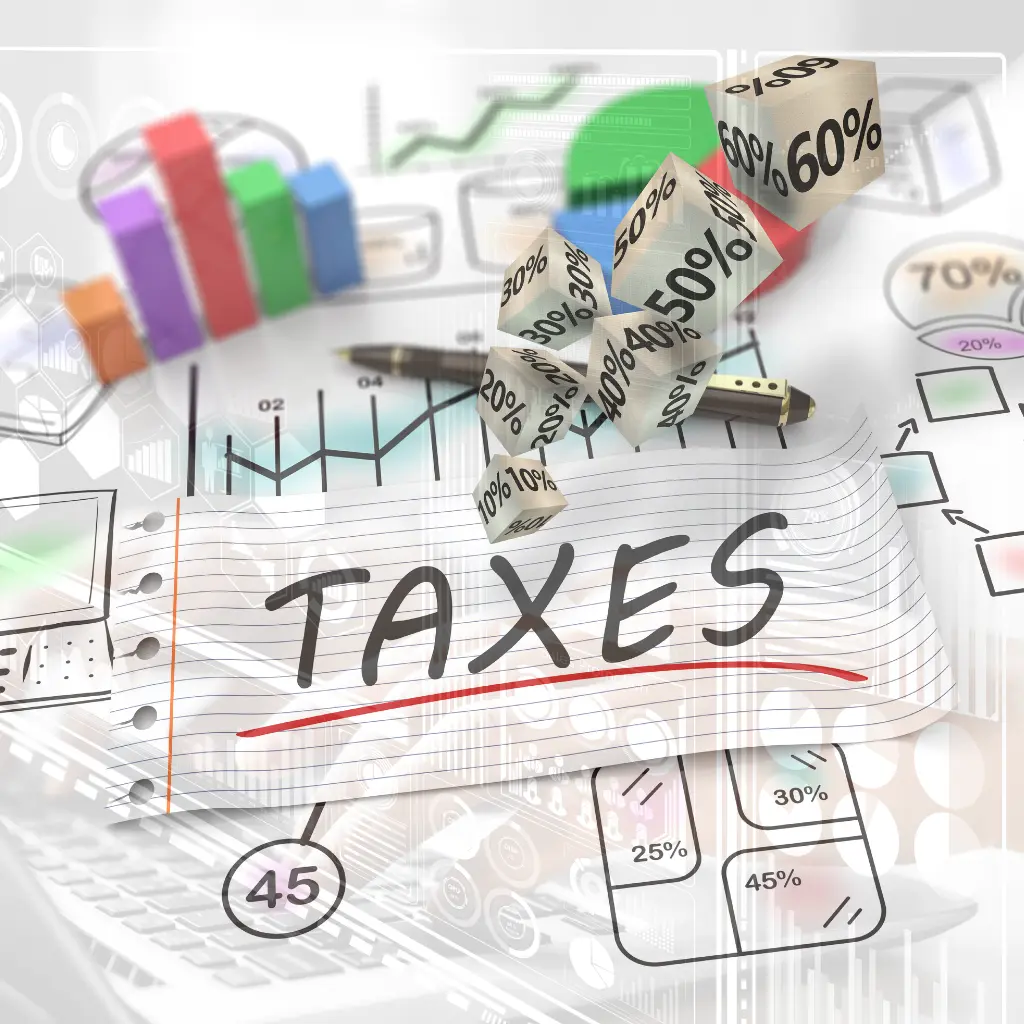
Revolutionizing Compliance and Audits
AI-Powered Tax Data Analysis
The interplay between Artificial Intelligence (AI) and the taxation system is a burgeoning frontier in the financial services sector. As global economies grapple with evolving compliance demands, AI in tax data analysis emerges as the game-changer.
AI’s imprint is undeniable, from enhancing audits with predictive analytics to providing personalized tax recommendations. But as we stand at this transformative crossroads, we must address the ethical implications and understand the broader economic ramifications.
This article comprehensively explores the present landscape of taxation, the innovations steering its future, and the global perspectives that shape its nuances. Discover the nexus between tax and AI and how it promises to redefine financial frameworks globally.
Table of Contents
The landscape of taxation today
Taxation has always been complex and intricately tied to the economy’s heartbeat. In the age of globalization, it’s rapidly evolving. AI in tax data analysis is the newest player, poised to redefine its contours. Countries worldwide acknowledge the potential of AI-driven tax planning, seeking ways to harness its capabilities. Yet, with the surge in financial transactions and globalized business operations, the tax realm is submerged in colossal data. Traditional tools need to improve in extracting insightful patterns.
Enter predictive analytics for audits. It promises a more innovative, efficient approach to assessing vast chunks of information. Tax authorities eye such innovations with optimism in their quest for precision and speed. Streamlining tax compliance now seems less daunting, offering a reprieve to professionals and businesses alike.
However, with great power comes the critical ethical implications of AI taxation. How fair is AI in its judgments? Can taxpayers trust personalized tax recommendations without fearing bias? As we inch towards a more technologically driven tax scenario, understanding the economic benefits of AI in tax becomes paramount.
For professionals, this shift beckons a new era of learning. Training tax professionals for AI integration isn’t just necessary but also imperative. And with the future shining bright, one can’t help but wonder: What does the future of tax software hold? How are different nations embracing global tax and AI innovations?
How exactly is AI reshaping our understanding of taxes?
AI's transformative role
Reshaping our understanding of taxes is precisely where AI’s prowess comes to the forefront. Historically, taxation rode on manual interpretations and tedious processes. But the integration of AI in tax data analysis heralds unprecedented change. It’s not just about speed; it’s about innovation.
At the core, AI-driven tax planning facilitates dynamic strategies, tailoring them to unique business needs. Through machine learning algorithms, vast troves of financial data become decipherable, paving the way for personalized tax recommendations. For businesses, this is game-changing. Accurate forecasts mean reduced liabilities and optimized financial health.
But it’s not just planning; it’s about prevention. Predictive analytics for audits empowers authorities to detect anomalies swiftly. Inconsistencies that once lurked in spreadsheets now find themselves under AI’s meticulous scrutiny. A result? A significant leap in streamlining tax compliance.
This transformation has economic ripple effects. The economic benefits of AI in tax include heightened efficiency and reduced manual errors. It’s a boon for the state and taxpayers alike. Still, as AI moulds the tax arena, questions arise: How does this influence the very nature of audits? How might AI be the tool to take audits to the next level?
Making audits more efficient
The evolving role of AI in the tax domain naturally leads us to reevaluate traditional auditing processes. Gone are the days when audits meant countless hours spent sifting through files and ledgers. With AI in tax data analysis, the auditing game is seeing a seismic shift.
Predictive analytics for audits is at the heart of this transformation. Audit teams can now forecast risk areas using AI, streamlining their focus on potential red flags. The data-crunching capability of AI means anomalies are detected faster, reducing the chances of human oversight. This proactive approach minimizes costly mistakes and reinforces the trust quotient in financial statements.
In tandem, AI-driven tax planning also lends a helping hand, ensuring businesses stay compliant and avert any potential audit triggers. In essence, the synergy between tax planning and audit efficiency offers robust personalized tax recommendations, making the audit trail smoother for firms.
Yet, with AI tools swiftly enhancing audit efficiency, what implications does this have on routine compliance? As audit tasks undergo this transformative phase, how will this AI-driven approach influence the broader domain of streamlining tax compliance?
Streamlining compliance tasks
The increasing efficiency in audit tasks prompts an inevitable question: How does AI revamp the broader realm of tax compliance? With the promise of AI in tax data analysis, the traditionally cumbersome and often daunting task of ensuring tax compliance is undergoing a significant overhaul.
Businesses can automate repetitive compliance tasks by leveraging AI, reducing errors and redundancies. Predictive analytics for audits finds its use in audits and aids in preemptive compliance measures. These predictive tools flag potential non-compliance areas, enabling firms to rectify them proactively.
The true genius of AI doesn’t just lie in automation. Personalized tax recommendations from advanced algorithms help tailor compliance strategies to each firm’s unique financial landscape. Moreover, AI-driven tax planning serves as a guide, navigating companies through the intricate maze of global tax regulations.
But as AI simplifies the once daunting compliance task, it inevitably paves the way for more personalized tax avenues. Training tax professionals for AI then becomes even more crucial. How can AI be leveraged to create customized tax strategies in a world of simplified compliance tasks for businesses and individuals?
Personalized tax strategies
In the AI-driven world of streamlined compliance, the allure of custom solutions becomes impossible to ignore. As AI in tax data analysis enhances compliance, it simultaneously unveils the potential for tailored tax strategies for businesses and individuals.
Harnessing AI-driven tax planning, firms can now receive strategies moulded around their specific financial situations rather than one-size-fits-all solutions. With its vast computational power, AI can analyze countless variables in real-time. The outcome? Personalized tax recommendations that align with business objectives mitigate risks and optimize savings.
Yet, the realm of personalization is for more than just enterprises. Individuals, too, stand to benefit immensely. Through modern global tax and AI innovations, taxpayers can gain insights tailored to their unique financial landscapes, making tax season less daunting and more strategic.
Amidst the advantages of AI-fueled tax strategies, trust is a pivotal aspect to consider. As AI delves deep into personal and corporate finances, offering bespoke solutions, how do we ensure the sanctity of the process? Where do we draw the line regarding ethics and fairness in AI tax in a world of data-driven personalization?
Ethics and fairness in AI tax
As we revel in the marvel of AI-driven tax planning and its customized offerings, it’s impossible to overlook the ethical quandaries it presents. Delving into personal and corporate finances while promising precision raises the flag of trustworthiness in AI in tax data analysis.
At the forefront of this debate is fairness. How do we ensure AI models trained on vast datasets don’t perpetuate existing biases? Ensuring ethical implications in AI taxation becomes paramount. The quest for personalized tax recommendations should maintain neutrality and fairness. Every taxpayer deserves an unbiased assessment, whether a multinational conglomerate or an individual.
Furthermore, the confidentiality of financial data is sacrosanct. With AI algorithms sifting through intricate financial details, data protection and privacy concerns amplify. Training tax professionals for AI isn’t just about understanding the tech; it’s about upholding the ethical standards synonymous with the profession.
Navigating this ethical maze, one realizes that the economic benefits of AI in tax are undeniable. However, they should always uphold the principles of fairness and trust. How might the economic landscape evolve in response as AI continues its march into the tax domain? What are the broader financial considerations of this tech-driven tax revolution?
Economic considerations
In the wake of ethical reflections on AI-driven tax innovations, a new dimension emerges: the broader economic implications. With AI in tax data analysis driving efficiencies and innovations, the ripple effects on the economy warrant attention.
The direct economic benefits of AI in tax are evident. Speedier tax processes and predictive capabilities mean reduced overheads for businesses. This, in turn, can spur investments as firms save on resources traditionally drained by manual tax operations. Moreover, streamlining tax compliance can lead to more consistent revenue streams for governments, bolstering public finances.
Yet, there’s another facet. With global tax and AI innovations, cross-border financial transactions can become more transparent and seamless. In a world where economies are interlinked, AI’s ability to navigate complex international tax regulations offers businesses the clarity to expand and operate globally with confidence.
However, as AI reshapes the economic terrain, the need for skilled professionals to navigate this landscape becomes imperative. Amidst this digital revolution, are current tax professionals equipped to handle changes? How essential is it now to focus on training tax professionals for AI to harness the full potential of these economic shifts?
Equipping tax professionals
As the economic landscape shifts with the advent of AI, the role of tax professionals is in the spotlight. Training tax professionals for AI isn’t a luxury—it’s a necessity. The digitization brought on by AI in tax data analysis demands a new skill set from these experts.
First, professionals must understand the intricacies of AI-driven tax planning. Grasping the algorithms, interpreting personalized tax recommendations, and ensuring the ethical use of these tools becomes paramount. Real-time, data-driven insights are overshadowing the age of manually sifting through ledgers.
But it’s not just about the tech. A crucial element is understanding the evolving global tax and AI innovations landscape. Tax professionals must be adept at leveraging AI to navigate the complexities of international regulations, ensuring businesses remain compliant while reaping the economic benefits.
Moreover, equipping professionals is about marrying the old with the new. The foundational principles of taxation, combined with the capabilities of AI, will shape the industry’s future. As professionals gear up for this future, one wonders how the toolkit they use for tax software is evolving. What are the latest innovations in tax software that will propel the industry forward?
Innovations in tax software
Building on the foundations laid by equipped tax professionals, the tools they wield are evolving dramatically. The recent innovations in tax software powered by AI in tax data analysis are revolutionizing the taxation landscape.
One notable innovation is the integration of predictive analytics for audits. Instead of traditional reactionary approaches, tax software now anticipates anomalies, flagging potential issues even before they surface. This proactive stance ensures compliance and minimizes risks.
Simultaneously, with AI-driven tax planning capabilities embedded, these software solutions provide personalized tax recommendations on the fly. They factor in global trends, ensuring businesses remain attuned to worldwide tax and AI innovations, even as they plan locally.
But it’s about more than just compliance and planning. The latest tax software also emphasizes user experience. Simplified interfaces, real-time data visualization, and interactive dashboards make the once-daunting tax tasks accessible and engaging.
As these software innovations redefine the very fabric of the tax world, a broader picture emerges. How are these tools being received and implemented globally? Are there universal standards, or do regional nuances dictate the approach? The curiosity now turns towards the global perspectives on AI in tax. How is the world responding to this AI-driven tax renaissance?
Global perspectives on AI in tax
The world is taking note in the wake of rapidly evolving tax software. Different regions are responding uniquely to the AI-driven tax renaissance, painting a diverse picture of global tax and AI innovations.
In advanced economies, there’s enthusiastic adoption of AI in tax data analysis. Europe, for instance, is pioneering frameworks that champion ethical implications in AI taxation and robust AI-driven tax planning. They recognize the transformative potential while upholding strict standards for fairness.
Emerging markets present another narrative. In regions like Africa and parts of Asia, there’s an eagerness to leverage AI to streamline infrastructural challenges, particularly in facilitating tax compliance. Here, AI becomes a tool not just for efficiency but also for economic empowerment.
Yet, amidst global enthusiasm, challenges arise. Different regions have varied interpretations of personalized tax recommendations and data privacy. This variance prompts crucial questions about uniformity and standards in a globalized world.
As we gaze upon this vast and varied AI tax landscape, one can’t help but ponder the road ahead. With such dynamic shifts in global tax perspectives, what does the future hold? As we wrap up, how do we envision the trajectory of AI in the financial services sector, particularly in taxation?
Concluding Thoughts: AI's Tax Revolution
The current landscape of taxation is witnessing a transformative wave. AI in tax data analysis is reshaping how we perceive compliance, audits, and tax planning on a global scale.
Predictive analytics for audits have heralded a proactive approach, preempting issues before they manifest. Such foresight not only ensures robust compliance but significantly elevates efficiency standards. This alignment with streamlining tax compliance has had resonating impacts, especially in emerging markets striving for economic empowerment.
Moreover, AI-driven tax planning grants businesses and individuals tailored, personalized tax recommendations. This personal touch, rooted in real-time data insights, promises optimized financial strategies for entities across the board.
Yet, as we embrace this new era, the ethical implications of AI taxation stand out. Balancing technological prowess with honest transparency is crucial. It’s heartening to witness regions like Europe championing these ideals, ensuring that AI’s transformative journey aligns with fairness and justice.
AI technology is being increasingly utilized in tax-related processes across the globe as its economic advantages are becoming more apparent. While training tax professionals for AI has become imperative, the innovations in tax software promise a more intuitive, user-centric tax experience.
But this isn’t a one-size-fits-all journey. Global tax and AI innovations highlight diverse regional narratives, hinting at the need for a harmonized approach in the future.
In wrapping up, the confluence of AI and taxation isn’t just a fleeting trend; it’s the dawn of a new era in the financial services sector. As we stand at this juncture, it’s evident that the future of tax software and the role of AI in it is bound to be revolutionary, reshaping economies and compliance standards globally.
Related Articles
- AI in Mergers and Acquisitions: Deals and Due Diligence
- Navigating Financial Regulations with AI: A New Era of Compliance
- Conversations with AI: The Rise of Banking Chatbots
- Hedging with Intelligence: AI’s Take on Hedge Funds
- Streamlined Lending: AI’s Role in Peer-to-Peer Financing
- AI Shields – Financial Fraud Detection and Prevention Systems
- AI in Real Estate Financing – Smarter Investment
- AI in Seamless Payments – The Future of Transaction Processing
- AI-driven Wealth Preservation – Tailoring Financial Legacies
- Robo-Advisors – The Digital Age of Investment Guidance
- Deciphering Creditworthiness with AI-driven credit scoring models
- From Cash to Code: How AI Powers Digital Wallet Evolution
- AI-Powered Financial Planning: Personalizing Your Journey
- The AI-Enhanced Insurer: Personalizing and Streamlining Claims
- Redefining Investment with AI: A New Era of Asset Management
- AI’s Role in Modern Banking: Revolutionizing the Financial World
- Harnessing the Power of IPA Tools in Finance: Use Cases, Advantages, and Challenges
- Other Articles on AI Usage in the Financial Sector
- Other Articles on AI usage in different industries

Arindam Roy
An Automation Consultant with 25+ years of IT Experience
Forbes Articles related to AI usage in the Financial Sector:
- The Future Of Data And AI In The Financial Services Industry
- The Future Of AI In Banking
- Generative AI: Transforming The Future Of Finance
- Artificial Intelligence Opens Up The World Of Financial Services
- The Benefits Of Customer Experience AI For Financial Institutions
- AI Adoption: The ‘A-Ha’ Moment For Finance Leaders And How To Take Advantage Of AI’s Potential
- Artificial Intelligence May Actually Help Humanize Financial Services























